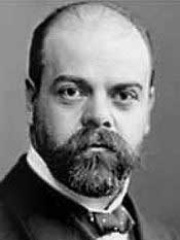
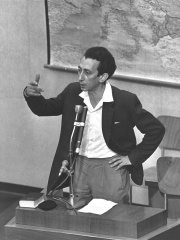
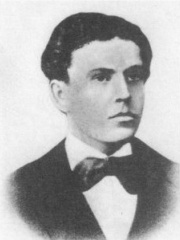
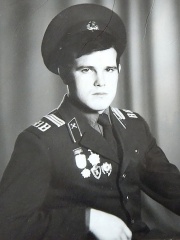
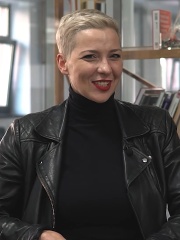
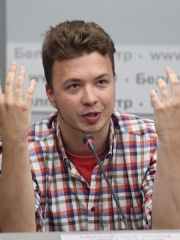
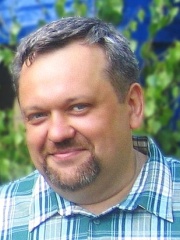
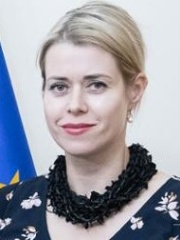
The Most Famous
SOCIAL ACTIVISTS from Belarus
This page contains a list of the greatest Belarusian Social Activists. The pantheon dataset contains 840 Social Activists, 11 of which were born in Belarus. This makes Belarus the birth place of the 21st most number of Social Activists behind Sweden, and Argentina.
Top 10
The following people are considered by Pantheon to be the top 10 most legendary Belarusian Social Activists of all time. This list of famous Belarusian Social Activists is sorted by HPI (Historical Popularity Index), a metric that aggregates information on a biography's online popularity. Visit the rankings page to view the entire list of Belarusian Social Activists.

1. Alexander Parvus (1867 - 1924)
With an HPI of 68.40, Alexander Parvus is the most famous Belarusian Social Activist. His biography has been translated into 26 different languages on wikipedia.
Alexander Lvovich Parvus, born Israel Lazarevich Gelfand (8 September 1867 – 12 December 1924) and sometimes called Helphand in the literature on the Russian Revolution, was a Marxist theoretician, publicist, and controversial activist in the Social Democratic Party of Germany.

2. Abba Kovner (1918 - 1987)
With an HPI of 63.04, Abba Kovner is the 2nd most famous Belarusian Social Activist. His biography has been translated into 21 different languages.
Abba Kovner (Hebrew: אבא קובנר; 14 March 1918 – 25 September 1987) was a Jewish partisan leader, and later Israeli poet and writer. In the Vilna Ghetto, his 1942 manifesto was the first time that a target of the Holocaust identified the German plan to murder all Jews. His attempt to organize a ghetto uprising failed. He fled into the forest, joined Soviet partisans, and survived the war. After the war, Kovner led Nakam, a paramilitary and terrorist organization of Holocaust survivors who sought to take revenge by murdering six million Germans, but Kovner was arrested in British-occupied Germany before he could successfully carry out his plans. He made aliyah to Mandatory Palestine in 1947, which would become the State of Israel one year later. Considered one of the greatest authors of Modern Hebrew poetry, Kovner was awarded the Israel Prize in 1970.

3. Ignacy Hryniewiecki (1856 - 1881)
With an HPI of 62.30, Ignacy Hryniewiecki is the 3rd most famous Belarusian Social Activist. His biography has been translated into 15 different languages.
Ignacy Hryniewiecki or Ignaty Ioakhimovich Grinevitsky (Russian: Игнатий Гриневицкий, Polish: Ignacy Hryniewiecki, Belarusian: Ігнат Грынявіцкі; c. 1856 — March 13, 1881) was a Polish member of the Russian revolutionary society Narodnaya Volya. He gained notoriety for participating in the bombing attack to which Tsar Alexander II of Russia succumbed. Hryniewiecki threw the bomb that fatally wounded the Tsar and himself. Having outlived his victim by a few hours, he died the same day. Hryniewiecki and his accomplices believed that the assassination of Alexander II could provoke a political or social revolution to overthrow the tsarist autocracy. Many historians consider the assassination a Pyrrhic victory, since instead of ushering in a revolution, it strengthened the resolve of the state to crush the revolutionary movement, leading to the movement's decline in the 1880s and setting Russia on a revitalized path of Tsarist autocracy which resulted in only incremental reforms after the Revolution of 1905 and, eventually, the Russian Revolution in 1917. Hryniewiecki's role in the assassination has sometimes been cited as the earliest occurrence of suicide terrorism.

4. Vasily Ignatenko (1961 - 1986)
With an HPI of 59.35, Vasily Ignatenko is the 4th most famous Belarusian Social Activist. His biography has been translated into 25 different languages.
Vasily Ivanovich Ignatenko (Ukrainian: Василь Іванович Ігнатенко; Belarusian: Васіль Іванавіч Ігнаценка; Russian: Василий Иванович Игнатенко; 13 March 1961 – 13 May 1986) was a Soviet firefighter who was among the first responders to the Chernobyl disaster. He worked as an electrician before being conscripted into the Soviet Armed Forces in 1980, where he completed his two years of service as a military firefighter. Afterwards, he took up employment as a paramilitary firefighter with Fire Brigade No. 6, based in Pripyat. On 26 April 1986, Ignatenko's fire brigade was involved in mitigating the immediate aftermath of the Chernobyl disaster; fighting the fires that broke out following the initial explosion of Reactor 4 at the Chernobyl Nuclear Power Plant. While on site, Ignatenko received a high dose of radiation, leading to his death at a radiological hospital in Moscow eighteen days later.
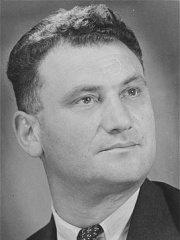
5. Tuvia Bielski (1906 - 1987)
With an HPI of 59.05, Tuvia Bielski is the 5th most famous Belarusian Social Activist. Her biography has been translated into 17 different languages.
Tuvia Bielski (May 8, 1906 – June 12, 1987) was a Polish Jewish militant who was leader of the Bielski group, a group of Jewish partisans who set up refugee camps for Jews fleeing the Holocaust during World War II. Their camp was situated in the Naliboki forest, which was part of Poland between World War I and World War II, and which is now in western Belarus.

6. Maria Kalesnikava (b. 1982)
With an HPI of 51.57, Maria Kalesnikava is the 6th most famous Belarusian Social Activist. Her biography has been translated into 40 different languages.
Maria Kalesnikava (Marya Alyaksandrauna Kalesnikava / Maria Aleksandrovna Kolesnikova; born 24 April 1982) is a Belarusian professional flutist and political activist. In 2020, she headed Viktar Babaryka's electoral campaign during the presidential elections of 2020 in Belarus. Kalesnikava represented the united campaign of Sviatlana Tsikhanouskaya, then she became a member of the presidium of the Coordination Council formed during the 2020 Belarusian protests in opposition to the regime of Alexander Lukashenko. She is also a founder of the 'Razam' political party. Kalesnikava was kidnapped by unidentified law enforcement officers on 7 September 2020 and the next morning taken into Ukrainian territory by force. Kalesnikava was intimidated and pressured to leave Belarus, but while on neutral ground she got out of the car through the rear window, tore her passport to pieces and went back on foot. On Belarusian territory she was arrested immediately. Maxim Znak, Kalesnikava's attorney, was detained the next day. On 11 September 2020, Amnesty International recognized Kalesnikava as a prisoner of conscience. She was awarded the International Women of Courage Award in 2021. On 6 September 2021, Kalesnikava was sentenced to 11 years in a penal colony for her political activity. She was released in December 2025.

7. Roman Protasevich (b. 1995)
With an HPI of 48.72, Roman Protasevich is the 7th most famous Belarusian Social Activist. His biography has been translated into 44 different languages.
Roman Dmitriyevich Protasevich or Raman Dzmitryevich Pratasevich (born 5 May 1995) is a Belarusian blogger and political activist. He was the editor-in-chief of the Telegram channel Nexta and chief editor of the Telegram channel Belarus of the Brain (Russian: Беларусь головного мозга). Protasevich and Sofia Sapega were arrested by Belarusian authorities after their flight, Ryanair Flight 4978, was diverted to Minsk on the orders of Belarusian president Alexander Lukashenko on 23 May 2021, because of a false bomb threat passed on by Belarusian air traffic control. On 3 May 2023, he was sentenced to eight years in prison. However, on 22 May, it was announced that Protasevich had been pardoned. Lukashenko later alleged that Pratasevich has been an agent of the Belarusian intelligence agency KGB.

8. Valery Levaneuski (b. 1963)
With an HPI of 47.25, Valery Levaneuski is the 8th most famous Belarusian Social Activist. His biography has been translated into 17 different languages.
Valery Stanislavovich Levaneuski (Russian: Вале́рий Станисла́вович Левоне́вский, Belarusian: Вале́ры Станісла́вавіч Леване́ўскі, Polish: Walery Lewoniewski) is a Belarusian political and social activist, and former political prisoner. Amnesty International recognizes him as a prisoner of conscience.

9. Veronika Tsepkalo (b. 1976)
With an HPI of 45.39, Veronika Tsepkalo is the 9th most famous Belarusian Social Activist. Her biography has been translated into 18 different languages.
Veronika Valeryevna Tsepkalo or Veranika Valereuna Tsapkala (Russian: Вероника Валерьевна Цепкало; Belarusian: Вераніка Валер’еўна Цапкала; born 7 September 1976) is a Belarusian political activist.
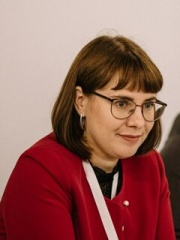
10. Olga Kovalkova (b. 1984)
With an HPI of 37.65, Olga Kovalkova is the 10th most famous Belarusian Social Activist. Her biography has been translated into 16 different languages.
Olga Kovalkova, also known as Volha Kavalkova (Belarusian: Вольга Аляксандраўна Кавалькова, romanized: Voĺha Aliaksandraŭna Kavaĺkova, Russian: Ольга Александровна Ковалькова; born 26 January 1984), is a Belarusian activist and a member of the presidium of the Coordination Council of Belarus that was formed by the presidential candidate Sviatlana Tsikhanouskaya to transition the political power in Belarus in the aftermath the 2020 Belarusian protests and the disputed 2020 Belarusian presidential election.
People
Pantheon has 11 people classified as Belarusian social activists born between 1856 and 1995. Of these 11, 6 (54.55%) of them are still alive today. The most famous living Belarusian social activists include Maria Kalesnikava, Roman Protasevich, and Valery Levaneuski. The most famous deceased Belarusian social activists include Alexander Parvus, Abba Kovner, and Ignacy Hryniewiecki. As of April 2024, 1 new Belarusian social activists have been added to Pantheon including Nasta Palazhanka.
Living Belarusian Social Activists
Go to all RankingsMaria Kalesnikava
1982 - Present
HPI: 51.57
Roman Protasevich
1995 - Present
HPI: 48.72
Valery Levaneuski
1963 - Present
HPI: 47.25
Veronika Tsepkalo
1976 - Present
HPI: 45.39
Olga Kovalkova
1984 - Present
HPI: 37.65
Nasta Palazhanka
1990 - Present
HPI: 36.18
Deceased Belarusian Social Activists
Go to all RankingsAlexander Parvus
1867 - 1924
HPI: 68.40
Abba Kovner
1918 - 1987
HPI: 63.04
Ignacy Hryniewiecki
1856 - 1881
HPI: 62.30
Vasily Ignatenko
1961 - 1986
HPI: 59.35
Tuvia Bielski
1906 - 1987
HPI: 59.05
Newly Added Belarusian Social Activists (2025)
Go to all RankingsOverlapping Lives
Which Social Activists were alive at the same time? This visualization shows the lifespans of the 5 most globally memorable Social Activists since 1700.


